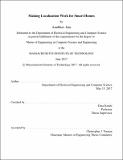Making localization work for smart homes
Author(s)
Jain, Anubhav, M. Eng. Massachusetts Institute of Technology
DownloadFull printable version (4.506Mb)
Other Contributors
Massachusetts Institute of Technology. Department of Electrical Engineering and Computer Science.
Advisor
Dina Katabi.
Terms of use
Metadata
Show full item recordAbstract
There is a great interest in enabling smart homes that interact with their occupants and react to their needs. Central to this vision is the ability to identify and locate each occupant continuously. Current indoor localization systems, however, fall into two classes: device-based localization which require the user to carry her device in order to localize her, and device-free localization which can localize a user but fail to identify her. Neither is suitable for smart homes where users may not carry the phone at home, yet smart applications (e.g., tuning to the user's favorite TV channel) require both location and identity. This thesis introduces Duet, an RF-based localization system customized for the smart home. Duet leverages device-free localization to track people's movements in the home, and then tags their trajectories with identity based on the users' intermittent interactions with their phones. Intrinsically, Duet has to deal with intermittent location information. Location information from a user phone is intermittent because it is valid only when the user carries the phone. Location information from device-free localization is intermittent because these systems have restricted coverage, and hence the user frequently goes in and out of coverage. Duet addresses this challenge by formulating the localization problem in first order logic, using its intermittent information to reason about a user's location even when she is outside the coverage area. We have built Duet and evaluated it over a period of two weeks, with users' own devices as they went about their normal life. In our home experiments, state-of-art WiFi-based localization achieved an accuracy of 36.3% because users often did not carry their phones. In contrast, for the same setting, Duet expanded the accuracy to 94.6%.
Description
Thesis: M. Eng., Massachusetts Institute of Technology, Department of Electrical Engineering and Computer Science, 2017. This electronic version was submitted by the student author. The certified thesis is available in the Institute Archives and Special Collections. Cataloged from student-submitted PDF version of thesis. Includes bibliographical references (pages 53-55).
Date issued
2017Department
Massachusetts Institute of Technology. Department of Electrical Engineering and Computer SciencePublisher
Massachusetts Institute of Technology
Keywords
Electrical Engineering and Computer Science.